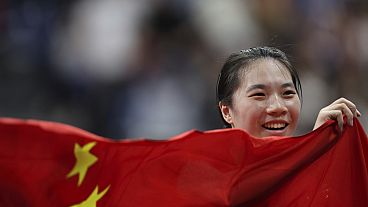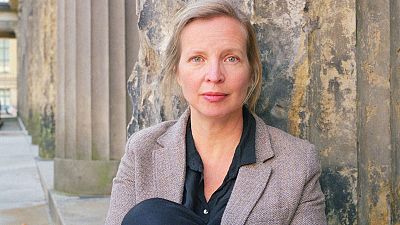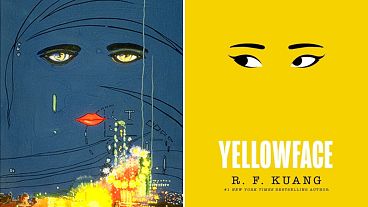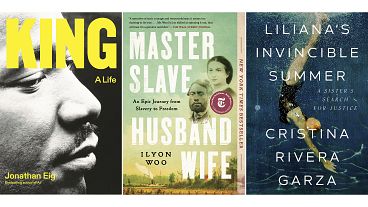The Neapolitan novel "My Brilliant Friend" by Elena Ferrante has topped several best-seller lists, even being described as the 'greatest' book of the 21st century. While the secrets of its success seem clear but the author's identity remains shrouded in mystery...
Elena Ferrante is one of the most acclaimed authors in the world. Yet, interviews with her are nearly impossible to find, as she (or he or they) maintains an extremely low-key profile to keep her identity secret.
To this day, readers do not know who Ferrante truly is. What they do know, however, is that she is making history.
“In the area where narcissism is overwhelmingly present, Elena Ferrante has decided to erase her ego,” Enrica Ferrara, scholar in Italian literature at Trinity College Dublin and novelist tells Euronews Culture about the Italian writer Ferrante.
Earlier this month, The New York Times Book Review ranked her book "My Brilliant Friend" number one on its list of the 100 best books of the 21st century based on a survey of authors, intellectuals and critics.
A ranking that was backed by The New York Times readers who placed the novel at 8th place in their own books’ top 100.
Since its publication, the first volume of the four-book series set in Naples has sold more than 10 million copies across 40 countries and inspired a successful TV series.
The friendship between Elena Greco (Lenù) and Raffaella Cerullo (Lila), two smart and brave children from a working-class neighbourhood in the 1950s, has captivated readers globally, sparking what is known as 'Ferrante Fever'.
But what makes this Italian novel so special? How has a story so deeply rooted in Italian history, politics, and society resonated with readers worldwide?
To answer these questions, Euronews Culture spoke to Enrica Ferrara and some bookworms from around the world.
The power of female friendship
“'My Brilliant Friend" speaks about female friendship and the mother and daughter relationship in a way no other writer has done before. That is what makes the story globally relevant,” says Ferrara.
'No one understood us, only we two - I thought - understood one another,' writes Lenù, the protagonist of "My Brilliant Friend" on her relationship with Lila, her fearless best friend who always excels in school.
The friendship between the two girls is the true protagonist of the story and appears to be one of the key elements behind Ferrante's success.
Ferrara believes that what resonates with women is Ferrante’s “visceral kind of writing,” which honestly depicts the complex nature of relationships.
In "My Brilliant Friend", in fact, there’s no space for idealisation. Page after page, the author unveils the mix of competition, profound admiration, shame and envy that bonds Lina and Lenù since their encounter in elementary school, making it easy for women to identify with the characters.
And Maya, a reader living in London, agrees. “The way Ferrante writes about female friendship is so unique, I have never read another book like that in my life,” she tells Euronews Culture.
Giving space to vulnerabilities
However, Ferrante did not secure first place on the New York Times list only because of her female followers.
According to Ferrara some people who do not identify as women are equally interested in discovering the female perspective. “Not all men are sexist chauvinists,” she adds.
Additionally, she believes that some men might be drawn to the vulnerability of the male characters in "My Brilliant Friend": “Men are trapped into a patriarchal cage, the same way that women are trapped into it.”
In Ferrante's world, some characters, like the powerful Solara, are the reincarnation of the white, straight, rich man. In contrast, others like Antonio Cappuccio, Lenù's first boyfriend, are kind souls, defenceless and exposed to this power dynamic, Ferrara explains.
“Ferrante describes a homophobic world dominated by violence where even men are uncomfortable, and that is what makes the book attractive to male readers,” says Ferrara.
Economic inequalities
Beyond allowing men to connect with their vulnerabilities, Frederic, a Belgian reader who owns a bookstore in the heart of Brussels, believes that the key ingredient that makes "My Brilliant Friend" so universal is its social and economic portrait of the world.
“It's for the Belgian, the French, the German, those who are neither rich nor powerful, it speaks to them,” he adds.
Indeed, the topics of economic inequalities, social injustice and corruption are more than just the context of the story - they define it from beginning to end.
In the book, both Lila and Lenù are diligent students, but since one’s family is more open to the possibility of their daughter studying, the two girls end up leading sharply different lives.
Asia, an Italian piano teacher, explains this concept with great clarity: “The story of Lila and Lenù shows that people’s social contexts and roots prevail over their natural temperament.”
Naples, everyone's city
Another compelling aspect of "My Brilliant Friend" is Naples, the city in which the story unfolds within the neighbourhood il Rione.
“Naples is like an imploded world,” Ferrara says. “It is all confined into a neighbourhood, a microcosm that acquires global relevance.”
Naples does not only pique the curiosity of Italian readers, but it also feels like home to everyone, even Maya, who grew up in London but has Brazilian background: "I was not familiar with the geographical and historical context of the book, but I felt connected to it," she says.
"Having some Italian untranslated words and similar nicknames for people, gave the idea of a community, a family just like any other," Maya adds.
To preserve the magic of the setting, Ferrante had invaluable support from the translators who worked on the book, translating Neapolitan words, vivid expressions, and character names while maintaining the original essence of the story.
Borderless identities
"She meant something different: she wanted to vanish; she wanted every one of her cells to disappear, nothing of her ever to be found," Lenù writes, describing Lila’s need to disappear.
While Elena Ferrante might share her name with Lenù, she is also tied with Lila in her passion for vanishing. Elena Ferrante is indeed a pseudonyme, no one knows her true identity, her story or even her gender.
Elena Ferrante "is an empty container with whom we can all identify," Ferrara adds.
Indeed, not knowing who Elena Ferrante is has resulted in limitless possibilities of identities, making it easier for everyone to resonate with the author and, by extension, with her characters.
Each character in "My Brilliant Friend" is enveloped in an aura of mystery where everything is blurred and identities have no boundaries.
"Ferrante wants to create a world where there is an absolute openness to the other, being female, male, sexual, transgender, and the non-human world technology, and this is what makes Elena Ferrante so enticing to the readers".
















